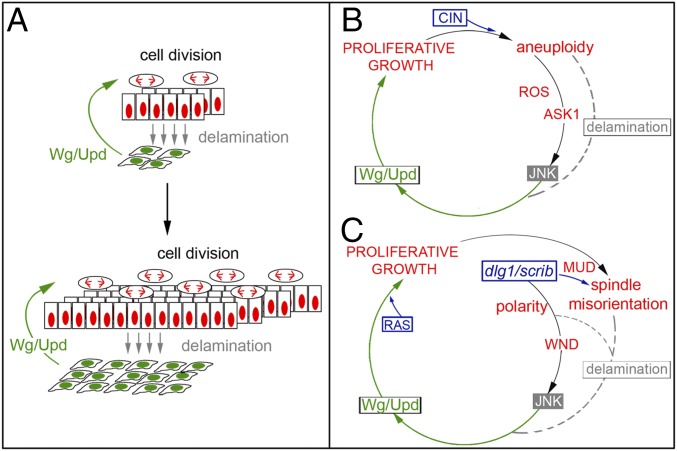Fig. 10.
A feedback amplification loop drives unlimited growth in epithelial tumors. (A) Cartoon depicting the cell populations and interactions responsible to the unlimited growth potential of epithelial tumors. While Wg and Upd emanating from basally delaminating cells (in green) promotes proliferative growth of the main epithelium (in red), the resulting increase in the number of mitotic events has a positive impact in the number of cells delaminating as a consequence of mistakes in the segregation of chromosomes or planar orientation of the mitotic spindle. (B) In CIN tumors, aneuploid cells activate in an ROS- and Ask1-dependent manner, JNK, which induces the expression of Wg and Upd. Those cells with the highest levels of aneuploidy delaminate basally and drive, through Wg and Upd, the proliferation of nondelaminating cells. Cell proliferation increases the chances of chromosome segregation errors and the levels of aneuploidy and, consequently, the pool of aneuploidy-induced delaminating cells. (C) In polarity-impaired tumors, loss of cell polarity determinants Scrib or Dlg1 activate, in a Wnd-dependent manner, JNK, which induces the expression of Wg and Upd. Defects in apicobasal polarity and planar orientation of the mitotic spindle as a consequence of loss of Scrib or Dlg1 induce cell delamination. Delaminating cells drive, through Wg and Upd, the proliferation of nondelaminating cells. Cell proliferation driven by the combined activities of Wg, Upd, and Ras increases the chances of defects in the planar orientation of the mitotic spindle and, consequently, augments the pool of Wg- and Upd-expressing delaminating cells.

